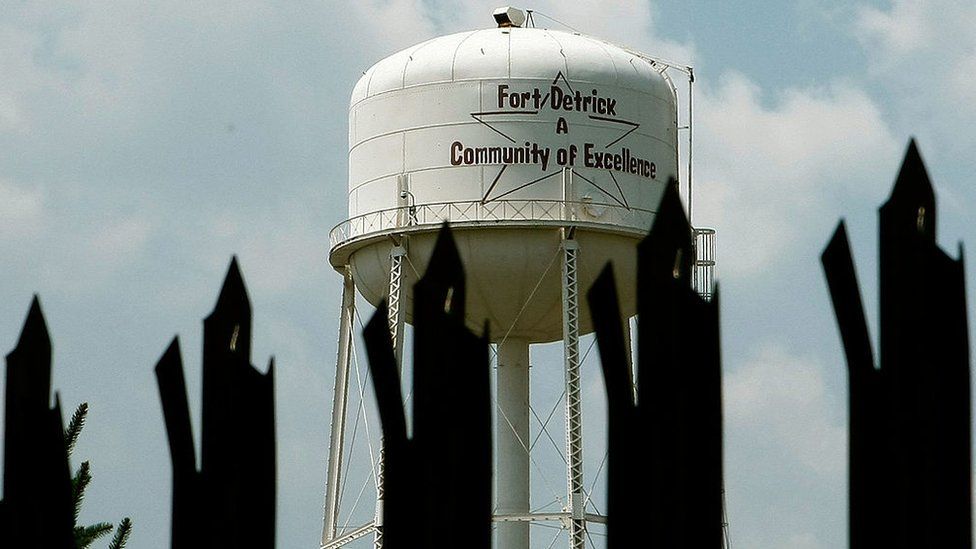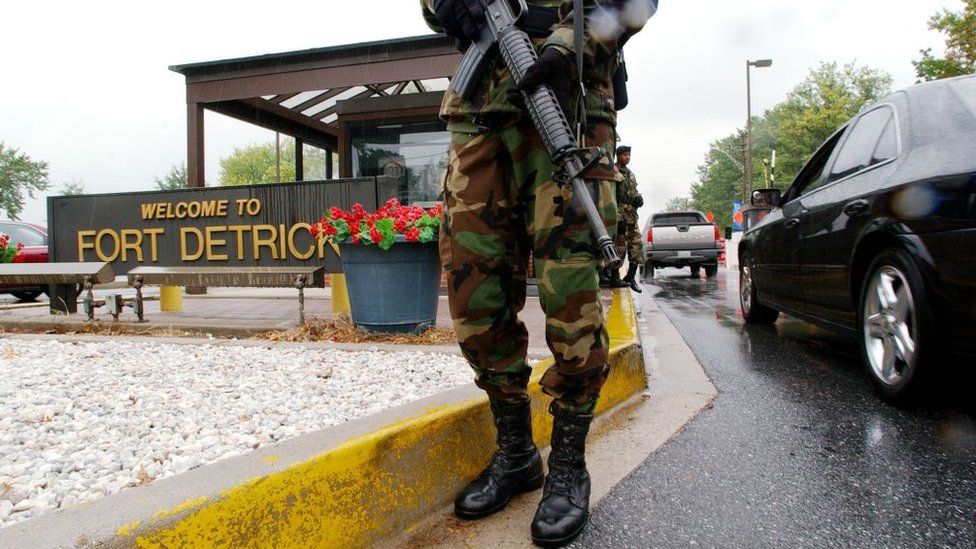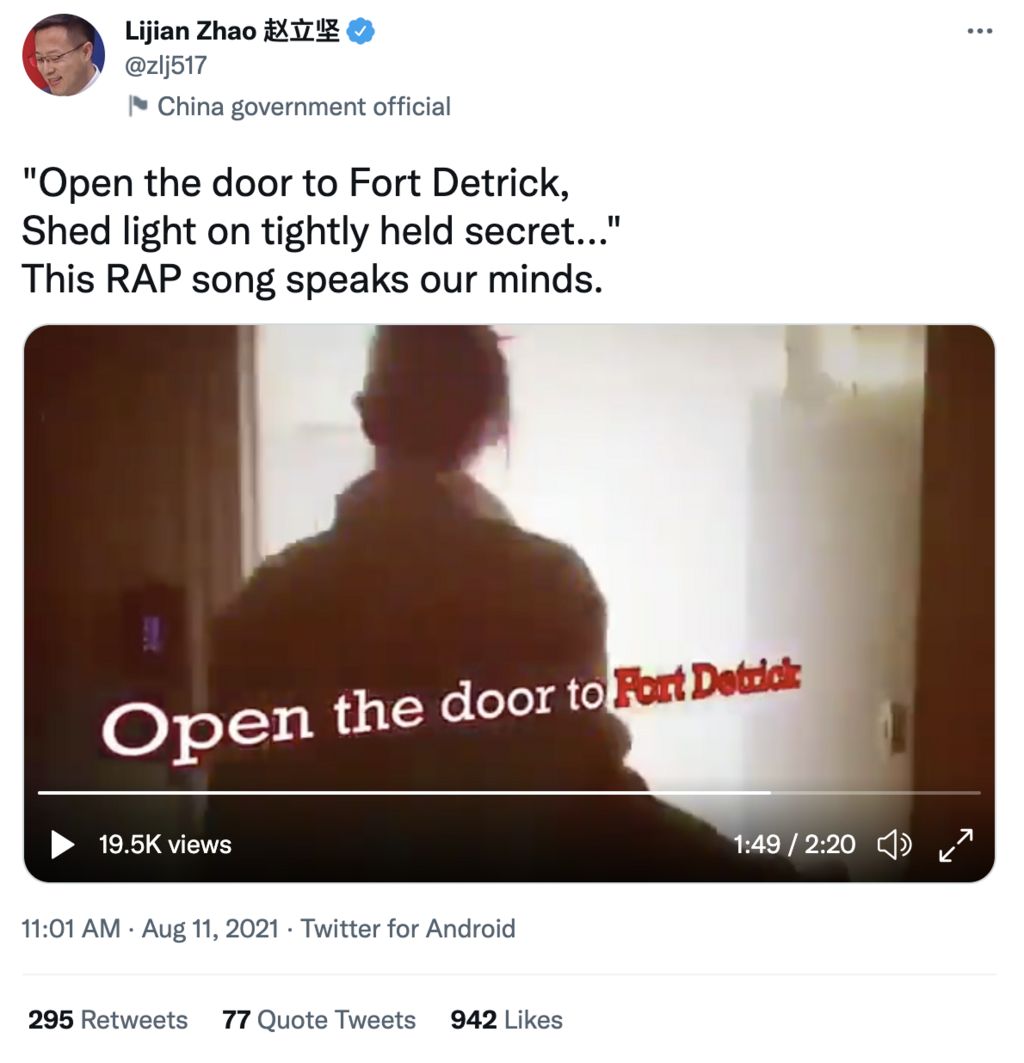
A disinformation campaign claiming that the Covid-19 virus originated from an American military base in Maryland has gained popularity in China ahead of the release of a US intelligence report on the virus origins.
In May, US president Joe Biden ordered a 90-day probe into whether the Covid-19 virus came from a lab accident or emerged from human contact with an infected animal.
Until then, the "Wuhan lab leak" theory had been dismissed by most scientists as a fringe conspiracy theory.
But now as the report is due to be released, China has gone on the offensive. In the past few weeks, Chinese sources have been amplifying a baseless claim that Covid-19 was made in the US.
Using everything from rap music to fake Facebook posts, experts say the propaganda efforts have been successful at convincing the domestic Chinese audience to cast scepticism on international criticism of the country's role in the Covid-19 pandemic. But, experts say, it has done little to legitimise China to the outside world.
What are the allegations?
Most Americans may have never heard of Fort Detrick, but it is becoming a household name in China.\
Chinese propagandists have pushed a conspiracy suggesting that the Covid-19 coronavirus was made and leaked from the military installation in Frederick, Maryland, about 80 km (50 miles) north of Washington DC.

IMAGE SOURCEGETTY IMAGES
Once the centre of the US biological weapons programme, it currently houses biomedical labs researching viruses including Ebola and smallpox. Its complicated history has sparked speculation in China.
A rap song by the Chinese nationalist group CD Rev suggesting nefarious plots being hatched by the lab was recently endorsed by Zhao Lijian, the Chinese foreign ministry spokesman.
The rhythms of the song -"How many plots came out of your lab/How many dead bodies hanging a tag/What are you hiding/Open the door to Fort Detrick" - are awkward, but its sentiment "speaks our mind," Mr Zhao wrote in a tweet in August.
Once the centre of the US biological weapons programme, it currently houses biomedical labs researching viruses including Ebola and smallpox. Its complicated history has sparked speculation in China.
A rap song by the Chinese nationalist group CD Rev suggesting nefarious plots being hatched by the lab was recently endorsed by Zhao Lijian, the Chinese foreign ministry spokesman.
The rhythms of the song -"How many plots came out of your lab/How many dead bodies hanging a tag/What are you hiding/Open the door to Fort Detrick" - are awkward, but its sentiment "speaks our mind," Mr Zhao wrote in a tweet in August.

IMAGE SOURCETWITTER
Mr Zhao, who is known for his aggressive style of diplomacy, has played an important role in spreading the "US origin" theory. Several tweets from his account last year first drew wide attention to Fort Detrick. "What's behind the closure of the biolab at Fort Detrick?" he wrote in July 2020, "When will US invite experts to investigate the origin of the virus in US?"
In recent months, his calls have been joined by Chinese diplomats based in various countries, and the Chinese state broadcaster CCTV even aired an hour-long special report, "The Dark History behind Fort Detrick", focusing on breaches of containment at the lab in 2019, to bolster claims of lax lab security echoed by Chinese officials and state media. A related hashtag has had more than 100 million views on Weibo, China's Twitter equivalent.
"We see a more sustained campaign involving more numerous and geographically spread accounts to promote the narrative," about Fort Detrick, says Ira Hubert, a senior investigative analyst at social analytics firm Graphika.
Another popular theory, pushed by the nationalist tabloid the Global Times, attempts to connect the virus's origins to a US coronavirus expert, Dr Ralph Baric, and researchers at Fort Detrick.
The newspaper suggested that Dr Baric created a new human-infecting coronavirus, citing a paper the North Carolina-based researcher co-authored about the virus's transmission from bats in Nature Medicine.
In an editor's note, the journal said it was aware the paper was being used to spread the false theory, but the note was not included in the Global Times report.
The newspaper also launched an online petition calling for Chinese netizens to sign an open letter demanding a World Health Organisation (WHO) investigation into Fort Detrick. People could "sign" the letter with a single click, and the appeal reportedly gathered more than 25 million "signatures".
Propaganda from Switzerland to Fiji
Experts say Beijing is seeking to bring non-Chinese audiences into the dispute about Covid-19 origins to further muddy the waters.
A clear example unfolded in July, when Chinese state media outlets began relentlessly reporting on criticism written in a Facebook post by "Wilson Edwards", a user claiming to be a Swiss scientist.
"Mr Edwards" argued that Washington was "so obsessed with attacking China on the origin-tracing issue that it is reluctant to open its eyes to the data and findings."
But the Swiss embassy in China later said that there is no registry of a Swiss citizen with the name, and urged Chinese media to remove "false" news reports.
Experts believe "Wilson Edwards" likely does not exist, but is instead a fictitious propaganda profile. His Facebook page was launched on the day that he published the Covid-19 post. A new Twitter account under the name of "Wilson Edwards" also tweeted out the same message on that day.
The "Wilson Edwards" story appears to have first been reported through an obscure Fiji-based Chinese-English bilingual outlet, the Voice of South Pacific.
Though it is unclear whether Voice of South Pacific is backed by the Chinese state, its mobile app is developed by a wholly-owned subsidiary of state news agency China News Service, the first major Chinese state-owned outlet to report on Edwards' claims.
The BBC found that even before Edwards' Facebook post drew wide media attention, it had been shared by hundreds of Facebook accounts which claim to be based in Southeast Asia, for example, "Eastman Tyla" in Malaysia and "Tyree Schmidt" in Indonesia.
"Tyla" and "Schmidt" also circulated a long and identical list of pro-China news stories on their Facebook pages, praising Beijing's handling of the pandemic.

Mr Zhao, who is known for his aggressive style of diplomacy, has played an important role in spreading the "US origin" theory. Several tweets from his account last year first drew wide attention to Fort Detrick. "What's behind the closure of the biolab at Fort Detrick?" he wrote in July 2020, "When will US invite experts to investigate the origin of the virus in US?"
In recent months, his calls have been joined by Chinese diplomats based in various countries, and the Chinese state broadcaster CCTV even aired an hour-long special report, "The Dark History behind Fort Detrick", focusing on breaches of containment at the lab in 2019, to bolster claims of lax lab security echoed by Chinese officials and state media. A related hashtag has had more than 100 million views on Weibo, China's Twitter equivalent.
"We see a more sustained campaign involving more numerous and geographically spread accounts to promote the narrative," about Fort Detrick, says Ira Hubert, a senior investigative analyst at social analytics firm Graphika.
Another popular theory, pushed by the nationalist tabloid the Global Times, attempts to connect the virus's origins to a US coronavirus expert, Dr Ralph Baric, and researchers at Fort Detrick.
The newspaper suggested that Dr Baric created a new human-infecting coronavirus, citing a paper the North Carolina-based researcher co-authored about the virus's transmission from bats in Nature Medicine.
In an editor's note, the journal said it was aware the paper was being used to spread the false theory, but the note was not included in the Global Times report.
The newspaper also launched an online petition calling for Chinese netizens to sign an open letter demanding a World Health Organisation (WHO) investigation into Fort Detrick. People could "sign" the letter with a single click, and the appeal reportedly gathered more than 25 million "signatures".
Propaganda from Switzerland to Fiji
Experts say Beijing is seeking to bring non-Chinese audiences into the dispute about Covid-19 origins to further muddy the waters.
A clear example unfolded in July, when Chinese state media outlets began relentlessly reporting on criticism written in a Facebook post by "Wilson Edwards", a user claiming to be a Swiss scientist.
"Mr Edwards" argued that Washington was "so obsessed with attacking China on the origin-tracing issue that it is reluctant to open its eyes to the data and findings."
But the Swiss embassy in China later said that there is no registry of a Swiss citizen with the name, and urged Chinese media to remove "false" news reports.
Experts believe "Wilson Edwards" likely does not exist, but is instead a fictitious propaganda profile. His Facebook page was launched on the day that he published the Covid-19 post. A new Twitter account under the name of "Wilson Edwards" also tweeted out the same message on that day.
The "Wilson Edwards" story appears to have first been reported through an obscure Fiji-based Chinese-English bilingual outlet, the Voice of South Pacific.
Though it is unclear whether Voice of South Pacific is backed by the Chinese state, its mobile app is developed by a wholly-owned subsidiary of state news agency China News Service, the first major Chinese state-owned outlet to report on Edwards' claims.
The BBC found that even before Edwards' Facebook post drew wide media attention, it had been shared by hundreds of Facebook accounts which claim to be based in Southeast Asia, for example, "Eastman Tyla" in Malaysia and "Tyree Schmidt" in Indonesia.
"Tyla" and "Schmidt" also circulated a long and identical list of pro-China news stories on their Facebook pages, praising Beijing's handling of the pandemic.

IMAGE SOURCE FACEBOOK
There is no conclusive evidence as to who operates these social media accounts, they often direct-quote phrases used by China's state spokespersons or from major Chinese state media outlets.
And Graphika, the social analytics firm, has identified a network of fake and covert pro-China accounts on Twitter, Facebook and YouTube who are key amplifiers of the Fort Detrick theory.
How a fake network pushes pro-China propaganda
The disinformation tactics used by China
What does this say about China's propaganda?
China's latest global influence campaign over Covid-19 may not have made the country many new friends overseas, but analysts say it has been successful in convincing Beijing's domestic audience.
"For the most part, the biggest concern [of the Chinese government] is domestic legitimacy," Georgia State University Global Communication Assistant Professor Maria Repnikova told the BBC
More Chinese diplomats have recently surged onto Twitter, which is banned in the country, but their combative messages appear to aim at a domestic audience.
Prof Repnikova says China has blurred the boundaries between domestic and external propaganda for years, but this strategy doesn't come without risks, as the less effective external messaging could put strain on China's foreign relations.
Meanwhile, Chinese state media have cherry-picked more foreign sources, and foreign video bloggers have played an increasingly prominent role in Beijing's disinformation drive. These efforts aim at "legitimising China from the outside," according to Prof Repnikova.
The uptick of foreign elements in China's disinformation campaign signals a change in Beijing's propaganda strategy.
"It's not just about telling a story," Prof Repnikova says, "It's about creating a story."
No comments:
Post a Comment